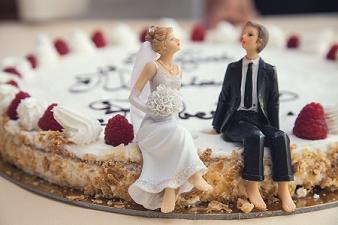Table of Contents
Many genealogists find marriage records contain very valuable information. Marriage records appeared long before other life records. In the old days, churches would create marriage records after performing a ceremony. They were often required to do this to conform with state law.
Marriage records have been open to all for a very long time. Details of marriage have been recorded in many different ways over the years. You will often find marriage records kept in the county or town of the bride. Really old marriage records usually resided in the archives of a state. More modern records reside in the Division of Vital Records for a state.
Intent to Marry Records
Not only can you find proof of marriages but there are also records of intent to marry. The most popular of these are marriage banns. This is basically a public announcement made by a couple that they want to get married. Sometimes couples were required to make this announcement so that others in the community could object to the marriage for various reasons.
Marriage banns are usually a custom rather than a legal requirement. It was common in the New England states as well as some Southern states back in the 1800s. A couple would need to make their marriage intention announcement for 21 days before the ceremony.
Marriage banns were often posted in the church and sometimes outside. Written notices revealed the intent and sometimes the local authorities would post the notices in public places. You can often find marriage banns in church registers as this was common practice.
Other Marriage Records
Licenses and Applications
Licenses and applications are another way to show marriage intent. Over time these replaced marriage banns and other methods of showing intention. To obtain an intent to marry license a couple needed to apply to the authorities. Licenses usually contained a great deal of useful information about the couple, their occupations, their parents, and so on.
Marriage Bonds
A popular trend in the mid 1800s in the middle Atlantic and Southern states was a marriage bond. This was a promise in writing from either the groom or one of the bride’s relatives to certify that the upcoming marriage was not illegal.
Marriage bonds posted by a bondsman were handed to church or other officials prior to the marriage ceremony taking place. After the ceremony, the band ended up with the clerk for the county or town.
Settlements or Contracts
A settlement or a contract provides protection for property and legal rights. These are fairly rare but do exist. In some states, a settlement or contract became part of the marriage application.
Parental Consent
If marriage requires the consent of parents or a guardian then you can find these included with marriage records. In the old days, it was not uncommon for a bride or a groom (or both) to be underage. A parent could provide their consent in written or verbal form. If written it was often included in the license.
The Recording of Marriages
One of the most common ways of documenting marriages is through the issuance of a marriage certificate. Usually, the person who performed the marriage (a church minister or a civil officer for example) will create the marriage certificate.
In many cases, the couple will receive a copy of the marriage certificate. Other offices can keep copies too such as the courts. When a marriage takes place a local authority clerk has the job of creating a marriage record. In the old days, they used a book or register to keep records of marriages. Anyone legally allowed to perform a marriage ceremony had to report the event to the clerk.
The old marriage records would normally include the couple’s full names, the location and the date of the ceremony and the name of the official that performed the marriage. In more recent times additional information appeared such as a marriage certificate number, witness names, details of the parents and the couple’s address.
You may find the following information included in marriage records:

- The ages of the couple when they married
- If the marriage took place in a church the name and location
- The county where the marriage occurred
- Date of birth and even place of birth of the couple
- The marriage date
- Bride and groom full names
- Name of the priest or minister or other official performing the ceremony
- Details of both sets of parents and sometimes their places of birth
- Witness names
- The occupation of the bride and groom
- Address details for the couple
- The marital status of the bride and groom
How Marriage Records can help with Research
When you locate marriage records for a person then it can help you further your research on them. If you wanted to find a current address for a person then a marriage record can help. It is also an alternative way to find out the date of birth of one or both of the individuals.
If a person has been married a number of times then marriage records can assist in the matching up of children with their parents. You can also find out if a person was married before. If you want to find a maiden name for a woman then a marriage record is a good place to start.
Where can you find Marriage Records?
You can visit the church where the couple married and look through their records. There will normally be a civil registration of the marriage as well in the county, town or city. Local newspapers often have marriage announcements and you can check obituary columns for the date of a marriage.
There are also a number of websites you can use to find marriage records. Use a search engine like Google as a starting point. There are websites hosted by some states that allow access to marriage records. You might find these a challenge to use and it really depends on how they are organized.
If you want a fast and easy way to find marriage records then use a quality online background checking service. The best services have links to databases across the country containing marriage records. It really couldn’t be easier to find what you want.
Marriage Records by State
- Alabama Marriage Records
- Alaska Marriage Records
- Arizona Marriage Records
- Arkansas Marriage Records
- California Marriage Records
- Colorado Marriage Records
- Connecticut Marriage Records
- Delaware Marriage Records
- District of Columbia Marriage Records
- Florida Marriage Records
- Georgia Marriage Records
- Hawaii Marriage Records
- Idaho Marriage Records
- Illinois Marriage Records
- Indiana Marriage Records
- Iowa Marriage Records
- Kansas Marriage Records
- Kentucky Marriage Records
- Louisiana Marriage Records
- Maine Marriage Records
- Maryland Marriage Records
- Massachusetts Marriage Records
- Michigan Marriage Records
- Minnesota Marriage Records
- Mississippi Marriage Records
- Missouri Marriage Records
- Montana Marriage Records
- Nebraska Marriage Records
- Nevada Marriage Records
- New Hampshire Marriage Records
- New Jersey Marriage Records
- New Mexico Marriage Records
- New York Marriage Records
- North Carolina Marriage Records
- North Dakota Marriage Records
- Ohio Marriage Records
- Oklahoma Marriage Records
- Oregon Marriage Records
- Pennsylvania Marriage Records
- Rhode Island Marriage Records
- South Carolina Marriage Records
- South Dakota Marriage Records
- Tennessee Marriage Records
- Texas Marriage Records
- Utah Marriage Records
- Vermont Marriage Records
- Virginia Marriage Records
- Washington Marriage Records
- West Virginia Marriage Records
- Wisconsin Marriage Records
- Wyoming Marriage Records